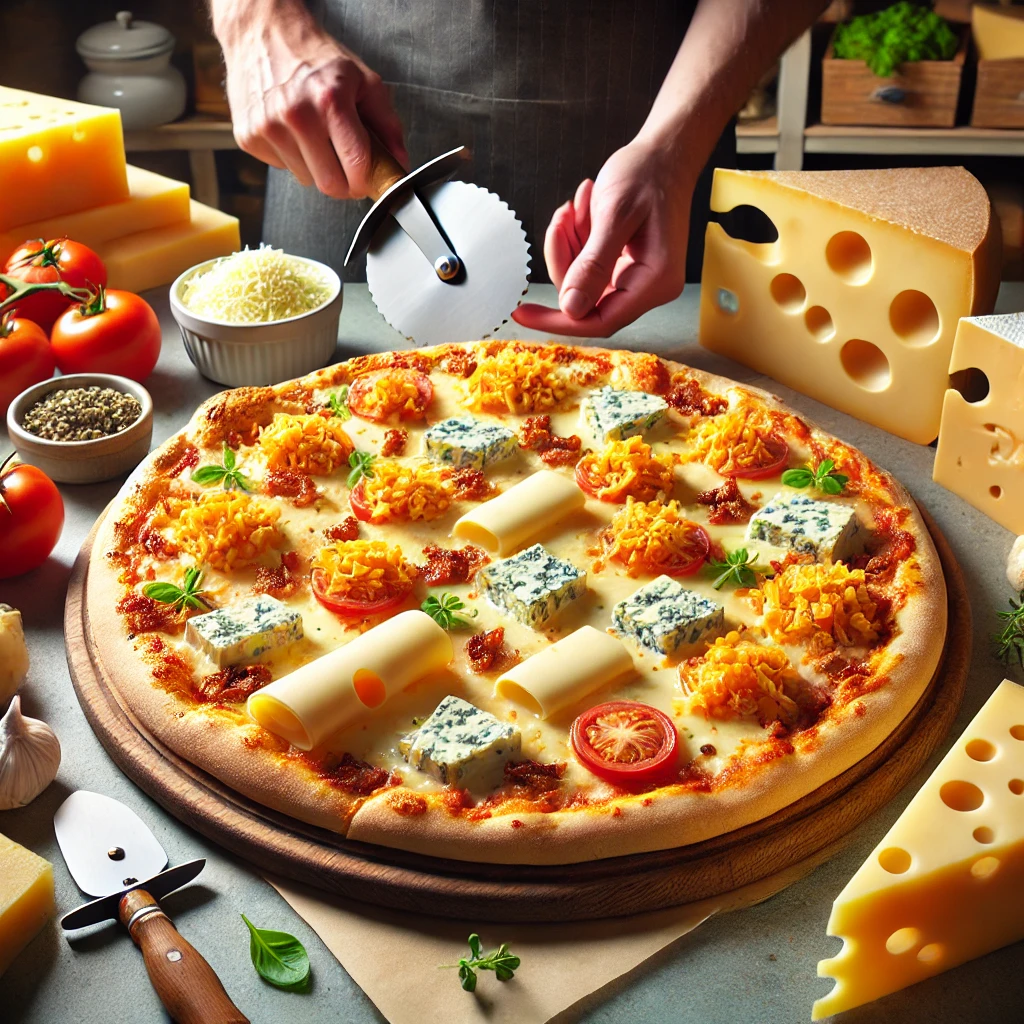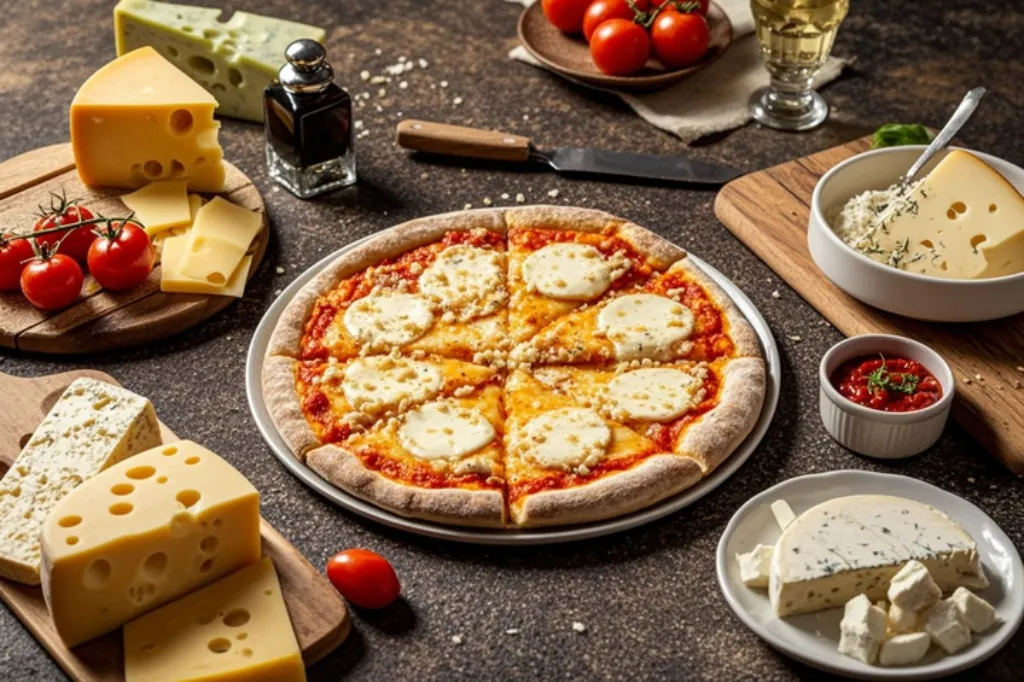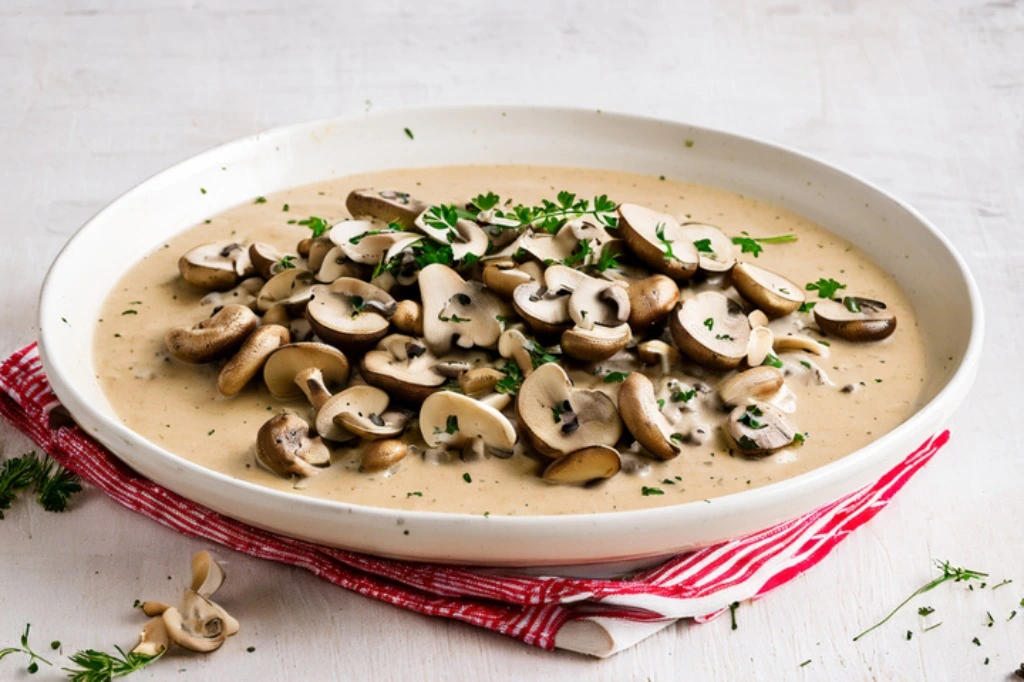
Introduction
Briefly introduce the role of cheese in making great pizza.
Set the tone with a personal touch as a chef/restaurant owner, sharing your passion for the perfect pizza.
2. The Importance of Cheese in Pizza
Explain how cheese affects the texture, flavor, and overall experience of the pizza.
Mention different types of pizzas and how cheese complements them.
3. Classic Cheese Choices
Mozzarella: Highlight why it’s the go-to cheese for pizza, its melting quality, and variations (fresh vs. shredded).
Provolone: Discuss its mild taste and how it blends well with other cheeses.
Cheddar: Explain its sharpness and how it adds a unique flavor when combined with other cheeses.
4. Specialty Cheeses for Unique Flavors
Parmesan: Touch on how it’s usually sprinkled on top for added richness.
Gorgonzola/Blue Cheese: Discuss how it works for specialty pizzas and gives a tangy kick.
Fontina: Explain its creamy texture and flavor, ideal for gourmet pizzas.
5. Vegan or Dairy-Free Cheese Options
Mention the growing demand for vegan cheese alternatives, and the best types that melt well and provide flavor.
6. How to Combine Cheeses for Perfect Pizzas
Suggest popular combinations like Mozzarella with Parmesan for a balanced flavor.
Share some tips on blending strong and mild cheeses to get a flavorful mix.
7. Expert Tips for Choosing the Best Cheese
Offer advice on what to look for when purchasing cheese (fat content, quality, texture).
Include storage tips to maintain freshness.
8. Personal Recommendations (Chef’s Choice)
List your personal favorite cheeses or combinations for the perfect pizza.
Mention any secret tips or unique pairings that make your restaurant’s pizzas stand out.
9. Conclusion
Encourage readers to experiment with different cheeses and create their own perfect pizza combinations.
Invite them to visit your restaurant to try the pizzas and cheese combinations you recommend.
What Are the Best Cheeses to Use for Pizza? (Chef’s Guide)
Pizza lovers know that the magic of a great pizza lies in its cheese. But what cheeses are the best for pizza? As a chef and restaurant owner, I’ve experimented with countless combinations to find the ideal cheeses for that perfect slice. Whether you’re making pizza at home or running a restaurant, let’s dive into the top cheeses you should consider.
Why Cheese Matters on Pizza
Cheese isn’t just a topping—it’s a core ingredient that defines the flavor, texture, and satisfaction of every bite. The way cheese melts, stretches, and blends with other toppings can make or break a pizza. Choosing the right cheese for pizza is an art, and it’s one that I’m excited to share with you.
The Classic Pizza Cheeses
-
Mozzarella: The King of Pizza Cheeses
-
Mozzarella is the most popular cheese for pizza, and for good reason! It melts perfectly, stretches beautifully, and offers a mild, creamy flavor. Fresh mozzarella is softer and less salty, making it ideal for traditional Italian-style pizzas like Margherita, while shredded mozzarella is great for New York-style pizzas.
-
-
Provolone: Mozzarella’s Best Friend
-
Provolone is a close cousin to mozzarella. It has a slightly sharper flavor and melts wonderfully, making it perfect for blending with mozzarella for a richer taste. It’s often used in Italian-American pizzerias for that authentic flavor.
-
-
Cheddar: For a Bold Twist
-
Cheddar isn’t a traditional pizza cheese, but it adds a sharp, tangy bite that many people love. Combining cheddar with mozzarella can create a delicious contrast, making your pizza stand out with a bold flavor.
-
Specialty Cheeses for Gourmet Pizzas
If you’re looking to elevate your pizza game, try experimenting with these specialty cheeses:
-
Parmesan: Best known as a finishing cheese, Parmesan adds a nutty, savory flavor. Sprinkle it on top of your pizza right after baking for that gourmet touch.
-
Gorgonzola/Blue Cheese: Ideal for specialty pizzas, Gorgonzola adds a sharp, pungent kick.
-
Fontina: This creamy, rich cheese melts smoothly and is perfect for gourmet pizzas. It has a mild, earthy flavor that pairs well with other cheeses.
Vegan and Dairy-Free Cheese Options for Pizza
With more people opting for vegan and dairy-free lifestyles, pizza cheese options have expanded. The best vegan cheeses for pizza are typically made from almond or coconut bases and are designed to melt similarly to traditional cheese. Brands like Daiya and Follow Your Heart offer dairy-free cheeses that don’t compromise on texture or flavor.
How to Combine Cheeses for the Perfect Pizza
One of my favorite things about making pizza is experimenting with different cheese combinations. For the best results, try these combos:
-
Mozzarella and Parmesan: A classic pairing for a well-balanced pizza.
-
Mozzarella, Cheddar, and Provolone: The cheddar adds sharpness, while mozzarella and provolone create the perfect melt.
-
Gorgonzola and Mozzarella: For a unique, gourmet pizza that packs a punch.
Tips for Choosing the Best Cheese for Pizza
As a chef, I’ve learned that not all cheeses are created equal. Here are some tips for the best cheese:
-
Fat content: Higher-fat cheeses generally melt better, creating that gooey, delicious texture we love.
-
Freshness: Fresh cheese will always give you the best flavor and melt.
-
Storage: Keep cheese wrapped tightly in the fridge and use it within a week for optimal taste.
Chef’s Choice: My Favorite Pizza Cheeses
At my restaurant, I always recommend a mix of mozzarella, provolone, and Parmesan. This blend gives the perfect balance of creaminess, flavor, and melt. For a more adventurous pizza, I love using fontina and a touch of blue cheese to create a flavor profile that’s truly memorable.
Conclusion: Experiment and Find Your Perfect Pizza Cheese
When it comes to pizza, there’s no right or wrong answer—only delicious options. Whether you stick with the classics or experiment with specialty cheeses, the key is to find what tastes best to you. Try out different combinations at home, or better yet, visit us to taste some of our chef-crafted pizzas!









Leave a Reply